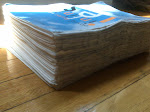Are books actually the problem?
Did books cause me to hate that suburban ceiling?
And what about the disease of writing, of thinking too much - never mind obsessively handblogging?
(And yes I am blogging while driving - in the rain.)
Are books actually the problem?
Did books cause me to hate that suburban ceiling?
And what about the disease of writing, of thinking too much - never mind obsessively handblogging?
(And yes I am blogging while driving - in the rain.)
My recent posts have compared the white sprayed stucco ceiling of my Mom's suburban house with the beautiful blue ceiling of my house downtown.
This post is about the IJ chapter which begins: "The following things in the room were blue."
The room in question is the headmaster's waiting room:
"Charles Tavis liked to say that you could tell a lot about an administrator by the decor of his waiting room."
The room has wallpaper with a blue-sky motif which Hal hates:
"...Hal loathes sky-and-cloud wallpaper because it makes him feel high-altitude and disoriented and sometimes plummeting."
Hmm - I wonder if this is similar to the sky motif of the book cover?
The cover that I just recently posted.
How did my mind anticipate these nuances?
It's just a coincidence right?
Tell me that I'm not trapped inside IJ, living IJ, thinking like DFW.
I always thought this way.
I wasn't changed by a book, a writer.
I haven't started thinking like the writer, talking like the writer, writing like the writer - have I?
We all muse about rooms and colours don't we?
All of us are deeply emotionally affected by rooms, spaces, environments - aren't we?
You all understand don't you why those suburban ceilings depressed me don't you?
But the depression wasn't bad though. I mean I wasn't suicidal or anything. The sight of those ceilings (and rooms, and houses and streets and people) was just very, very painful and I just felt trapped is all. Not suicidal.
Besides, I had books. Books over-rode the monstrous sameness of the burbs. Books got me out. Gave me hope. Entertained my brain. They were The Entertainment - and the hope. For if I had been forced to spend my time in those horrendous suburban rooms without books - wait a minute - I wouldn't be alive today.
Wait a minute - books saved my life.
But I wasn't suicidal.
Other people are suicidal.
And suicide is a very obvious thing that hits you quickly like a bolt of lightning or a car accident.
You know what they say in newpaper code: "He died SUDDENLY".
Boom. Quick. That's suicide. A nuclear bomb.
Like when my brother died. Like when DFW died.
It - suicide - is not a long, long period of pain that wears you down until you got nothing left.
No.
It's got nothing to do with feeling trapped. Like in a cage.
No.
No, it's sudden.
Out of the blue.
Right?
I can hear my Mom's footsteps downstairs as she scurries around the house like a hamster.
Yes folks I do have my pages with me and hope to resume my reading career now that my Education Ministry "sabbatical" is in full effect.
Am pleased with the 505th page since it puts me back into touch with Ennet House. I need that bit of drug and alcohol recovery perspective since this morning I am once again feeling the effects of a late night and unfettered drinking.
I went to see the Abbot's band play last night. Thankfully though I didn't close out the place as I usually do because this dutiful son had to wake up early to drive his stroke-addled Mama Vivant to a hospital in the hideous suburbs for an MRI to confirm that yes both of her carotid arteries are blocked x number of percent.
Can't wait to get old.
The photo you see captures one of the most depressing aspects of my youth: the dour white sprayed stucco ceiling. I read a lot when I was young and idealistic and wifeless and kidless and mortgageless and wanting to escape the depressing burbs. It was quite a painful paradox: I needed to read to dream of escaping those suburban sprayed stucco ceilings and yet that was the only backdrop I could ever have as I read day after day on my back. My room and that ceiling was part of my "cage".
I really should do some reading now...
I'd like to finish reading the IJ by the end of the summer.
But I'm not tied to that "goal".
I really don't want to be tied to anything this summer - except maybe the Blonde Woman.
I'd like to have a lot of long, slow orgasms this summer and not worry about having a reading "goal".
Tying myself to such a goal would perhaps make my summer painful, whereas I want it to be languid.
I don't want to create a cage for myself (after having only yesterday escaped from the Education Ministry) - like the fool who is incarcerating himself (and his unfortunate followers) inside an "Infinite Summer" reading project (Thanks for the link to that crazy-assed story, Pinot). I repeat - that guy is a fool and needs help.
THAT is no way to "read" a book or live a summer.
Come to think of it, I don't think people should read books. They should live them.
And if you're living a book, you gotta really just take it day by day, page by page, orgasm by orgasm. It's the moment that counts - not the calendar. Not a checklist. F*uck that.
Man, I'd forgotten how tiring handblogging can be. I really should be reading instead of "writing"...zzzzz....
"Summer breeze, makes me feel fine Blowing through the jasmine in my mind Summer breeze, makes me feel fine Blowing through the jasmine in my mind"
...zzzzz....
"Summer breeze, makes me feel fine Blowing through the jasmine in my mind Summer breeze, makes me feel fine Blowing through the jasmine in my mind"
...zzzzz....
"Summer breeze, makes me feel fine Blowing through the jasmine in my mind Summer breeze, makes me feel fine Blowing through the jasmine in my mind"
...zzzzz....
"One can, then, resist the notion that psychoanalysis "explains" literature and yet insist that the kind of intertextual relation it holds to literature is quite different from the intertextuality that obtains between two poems or novels, and that it illuminates in quite other ways. For the psychoanalytic intertext obliges the critic to make a transit through a systematic discourse elaborated to describe the dynamics of psychic process. The similarities and differences, in object and in intention, of this discourse from literary analysis creates a tension which is productive of perspective, of stereoptical effect. Psychoanalysis is not an arbitrarily chosen intertext for literary analysis, but rather a particularly insistent and demanding intertext, in that mapping across the boundaries from one territory to the other both confirms and complicates our understanding of how mind reformulates the real, how it constructs the necessary fictions by which we dream, desire, interpret, indeed by which we constitute ourselves as human subjects. The detour through psychoanalysis forces the critic to respond to the erotics of form - that is, to an engagement with the psychic investments of rhetoric, the dramas of desire played out in tropes. Psychoanalysis matters to us as literary critics because it stands as a constant reminder that the attention to form, properly conceived, is not a sterile formalism, but rather one more attempt to draw the symbolic and fictional map of our place in existence."
P. 43-44, Psychoanalysis and Storytelling
On top of this of course I have been using my precious time to blog soccerfootball, play canadiansport, pursue winedrinkingmoments around town and - of course - shag the Blonde Woman.
In the photo my son is writing his homework. Writing a response. For a grade 4 class.
We have written numerous versions of this response and my son has become visibly angry with the writing and with me.
Should I be encouraging him in this pursuit? Isn't writing dangerous? Doesn't writing put people over the edge?
Why on earth do people write? Why do they read?

